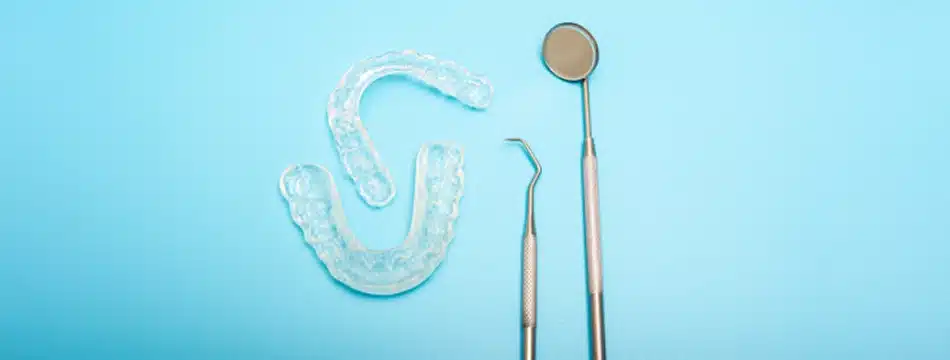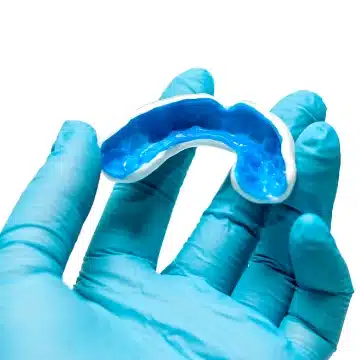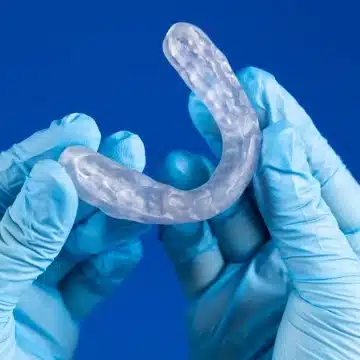Bruxing is the dental term for grinding, and grinding your teeth actually exerts powerful forces not only on your teeth, but also to the surrounding gums and joints. Bruxing can be multi-directional (meaning your jaw may move side to side and/or front to back).
The terms “splint” and “guard” are often used interchangeably (like crown or cap), but a guard is like a suit of armor for use in a sport where a splint is a therapy type of treatment. You would wear a guard if you were playing hockey, a splint to keep from grinding your teeth at night.

Other Preventive Services
Athletic Mouth Guards

If you have ever been actively involved in (or have any children that play) ice hockey, lacrosse, football, boxing, wrestling, racquetball or martial arts, then you are probably quite aware of the potential these activities can present for unplanned trips to the emergency room. One of the simplest, yet often overlooked, ways of protecting yourself (or your children) against sports related dental injuries is to use an athletic mouth guard. A mouth guard is a flexible, custom-fit device that is worn over the teeth to directly protect both hard and soft tissues.
While teeth are somewhat protected with the use of helmets and shields, an athletic mouth guard, also sometimes referred to as a mouth protector, is worn directly over the teeth so it protects both hard and soft tissues in the mouth much more effectively. In addition to protecting against chipped, broken and lost teeth, root and bone damage, they safeguard against jaw fracture, cerebral hemorrhage, concussion and neck injuries (this can happen if the lower jaw slams into the upper).
According to the ADA, studies show that an athlete is 60 times more likely to suffer harm to the teeth when not wearing a mouthguard. It’s also worth noting that the cost to repair sports related dental injuries can be ten times the price of the mouthguard.
Getting fitted for a mouthguard is easy and only requires two office visits; the first to take an impression (which is then sent to our dental lab) and the second appointment (approximately three weeks later) to try it on and take it home. You are then free to go out and moonlight as Muhammad Ali.
Bite Splints (Night Guards)

Bruxism, occlusal, bite splints or ‘night guards’ are removable, acrylic appliances that protect both your teeth (and any work you might have had done on them), from clenching and grinding, frequently due to stress – thereby eliminating the need for additional work. In addition to safeguarding against fracture and wear, a splint can also manage jaw issues, headaches, and TMJ as well as help to stabilize your bite.
A bite splint is part of on overall course of treatment, so depending on your symptoms and diagnosis, your actual splint can either cover your entire upper arch, or just the front two teeth. Like the mouth guard, it also requires two initial office visits, where an impression is made of your teeth and measurements are taken as we collect information about where your jaw hinges and where your teeth make contact. Our dental lab then fabricates the splint and three weeks from your initial appointment you come back in for the splint to be fitted and adjusted in your mouth.
While both the athletic guard and the bite splint are custom-made appliances fitting precisely to meet your specific needs, the bite splint also requires follow up appointments for additional adjustments to be made as your muscles start to relax and re-train around the splint. Of course, you may also want to take up yoga or, in my case, model airplane building, to help relieve some of that stress at the same time.
Bite splint adjustments can generally be made during your regular, 6-month dental cleaning and check-up appointment. Bite splints can save a lot of wear-and-tear on your teeth, particularly if you’re a night grinder.
What’s the difference?
While both start with taking an impression of your mouth, splints are designed with the mechanics of your mouth and jaw in mind which is why Dr. Drews will be measuring with a little ruler and having you put on a ‘face bow’ (which looks like something you’d see in a medieval torture chamber, but actually doesn’t hurt at all).
- With guards it’s all about protecting your smile from damage.
- With splints, it’s all about bite evaluations and retraining your muscles to help ensure you’re not damaging your own smile.
If you’re active in a contact sport or suspect you might be grinding your teeth without even knowing it give us a call at (207) 782-5308. We’ll be more than happy to schedule an appointment to talk all about how a guard or a splint can help you protect your teeth.

Looking for Customized Protection?




